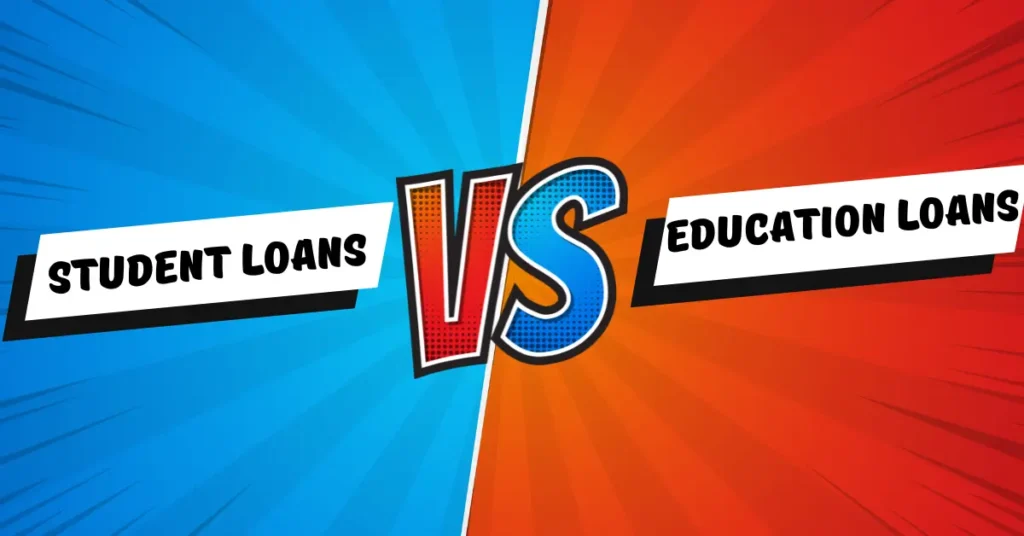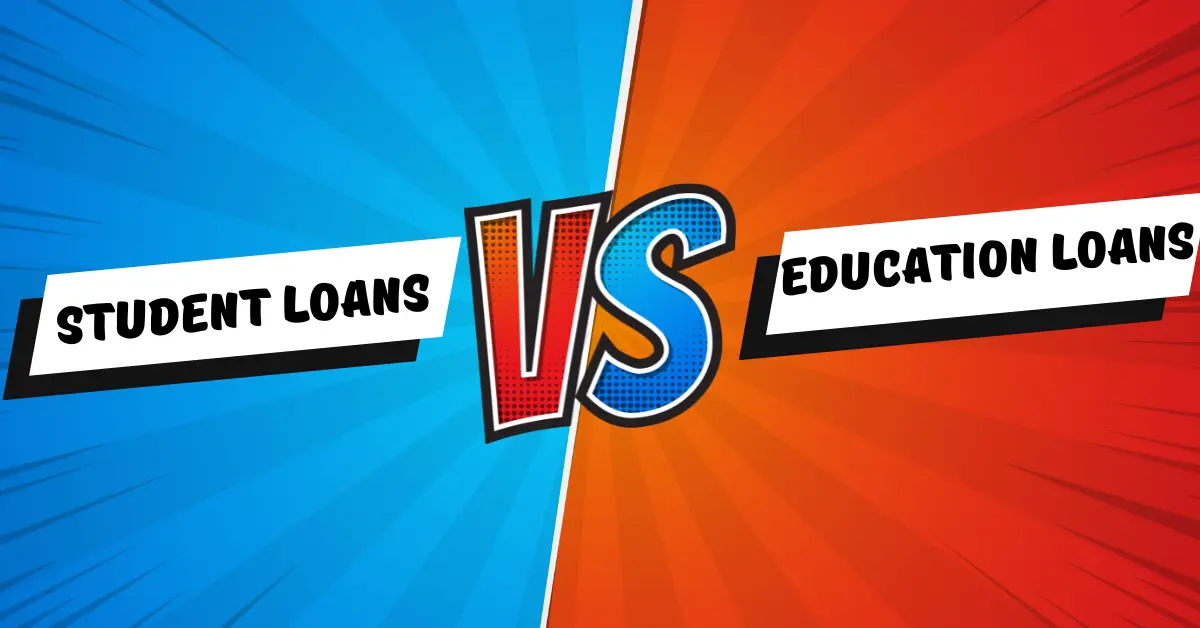Before applying for a loan, students must know the primary and significant differences between student loans and education loans.
After getting appropriate information, students can select the most valuable, beneficial, and effective loan options that suit their needs and requirements.
Proper research and comparison between loan options can be convenient in selecting the financing option that best suits your educational needs and financial circumstances
11 Differences Between Student Loans and Education Loans
Student loans and education loans may look similar on some occasions, but there are significant differences between student loans and education loans, which are included below in the tabular form.

| # | Student loans | Education loans |
|---|---|---|
| 1 | Student loans are specially designed and developed for aspirants enrolling in higher education. To cover these education expenses, such as tuition, books, and living expenses, students avail themselves of Student loans. | Education loans are specially designed and developed for aspirants who enroll in vocational courses or private certification programs. |
| 2 | Student loans are offered to students who have enrolled or registered with institutes, colleges, and universities that are well known and follow specific rules, terms, and regulations that are mentioned. | Education Loans may be offered to students who are pursuing education from private institutions or traditional college or university programs. |
| 3 | Student loans are specially designed for students, so they are responsible for the repayment. | Student loans can be obtained by parents on behalf of their children when their children are minors. |
| 4 | The loan repayment options are flexible and can be paid after course completion. | Education loans may require immediate repayment or offer more varied repayment schedules. |
| 5 | Student loan interest rates can be fixed or variable. These loans may be subsidized or unsubsidized by the government or private organizations. | Education loans may vary entirely depending on the lenders and borrowers. |
| 6 | Student loans have certain caps and restrictions that are decided based on the education they are taking. Higher education requires higher student loans. | Education loans offer higher borrowing limits. |
| 7 | Government agencies or private financial institutions commonly offer student loans. | Banks, credit unions, government entities, or alternative lenders may provide education loans. |
| 8 | Student loans may only sometimes require a credit check, particularly for federal loans. | Education loans typically involve a credit check. |
| 9 | Student loans often offer various repayment plans, including income-driven options based on post-graduation earnings. | Education loans generally do not come with subsidized interest options. |
Related Articles
- How to Choose a Solar Installer to Finance B2B
- 7 Powerful Startup Business Loan For Women Entrepreneurs
- Where to Finance a ps5
- What is Fund Finance Investment Banking
- Discover 7 Ways: How to Get the Lowest Interest Rate Loan
- Debt Consolidation Loan: Top 7 Solutions to Streamline Your Finances
- 4 Types of Finance With Examples
- How to Get An Education Loan For MBA
- A Practical Guide to Quantitative Finance
- How to Get a Mortgage Loan & Secure Your Home
- Computer Basic Tutorials
Which Bank is Best for Education Loan?
| 1 | Sallie Mae |
| 2 | Wells Fargo |
| 3 | Citizens Bank |
| 4 | Discover Student Loans |
| 5 | PNC Bank |
| 6 | SunTrust (now Trust) |
Who is Eligible for Student Loan?
Student loan eligibility criteria depend on various factors, some of which are mentioned below.
- Students.
- Parents.
- Cosigners.
- Nontraditional Students.
- Citizens and Permanent Residents.
- Enrolled in Eligible Programs.
- Meet Financial Aid Requirements.
Frequently Asked Questions [FAQs]
Are student loans and education loans the same?
Both are similar but serve distinct purposes.
Who is eligible for a student loan?
There are various eligible criteria for student loans. Some are.
1] Education Qualification.
2] Residence Proof.
3] Institute and college enrollment certificate.
4] Credit Score.
Can I take an education loan as a student?
Yes, you can.
What are the repayment terms for student loans and education loans
Student loans often offer deferred repayment options and forgiveness programs, whereas education loans may have more immediate repayment requirements and fewer forgiveness options.
Where can I apply for student loans and education loans?
Government agencies or private financial institutions commonly offer student loans,
Get In Touch
Student loans and education loans allow students to carry out their education with the financial support and assistance provided by government institutes and private organizations.
Their main goal is to provide financial freedom for students to complete their education qualifications; the funds offered by education or loans can be quickly repaid with low interest rates.
There are distinct differences between student loans and education loans, some of which are mentioned in the above article.
Both education and student loans have different eligibility criteria, so students need to exercise more caution before applying.
Some lenders also offer students an online facility for applying for loans.
I have also written and compiled some articles on computers and telecommunications. Please go through them.
I hope you will like reading it.
Here, we answer all the questions and queries about the difference between student loans and education loans.
If you have any questions about student loans vs. education loans.
Don’t hesitate to contact me, and if you feel like adding, removing, or updating anything from the article, please let me know in the comment section or via email.
I will be more than happy to update the article. I am always ready to correct myself.
Please share this article with your friends and colleagues; this will motivate me to write more related articles.
!!! Thank You For Reading !!!
